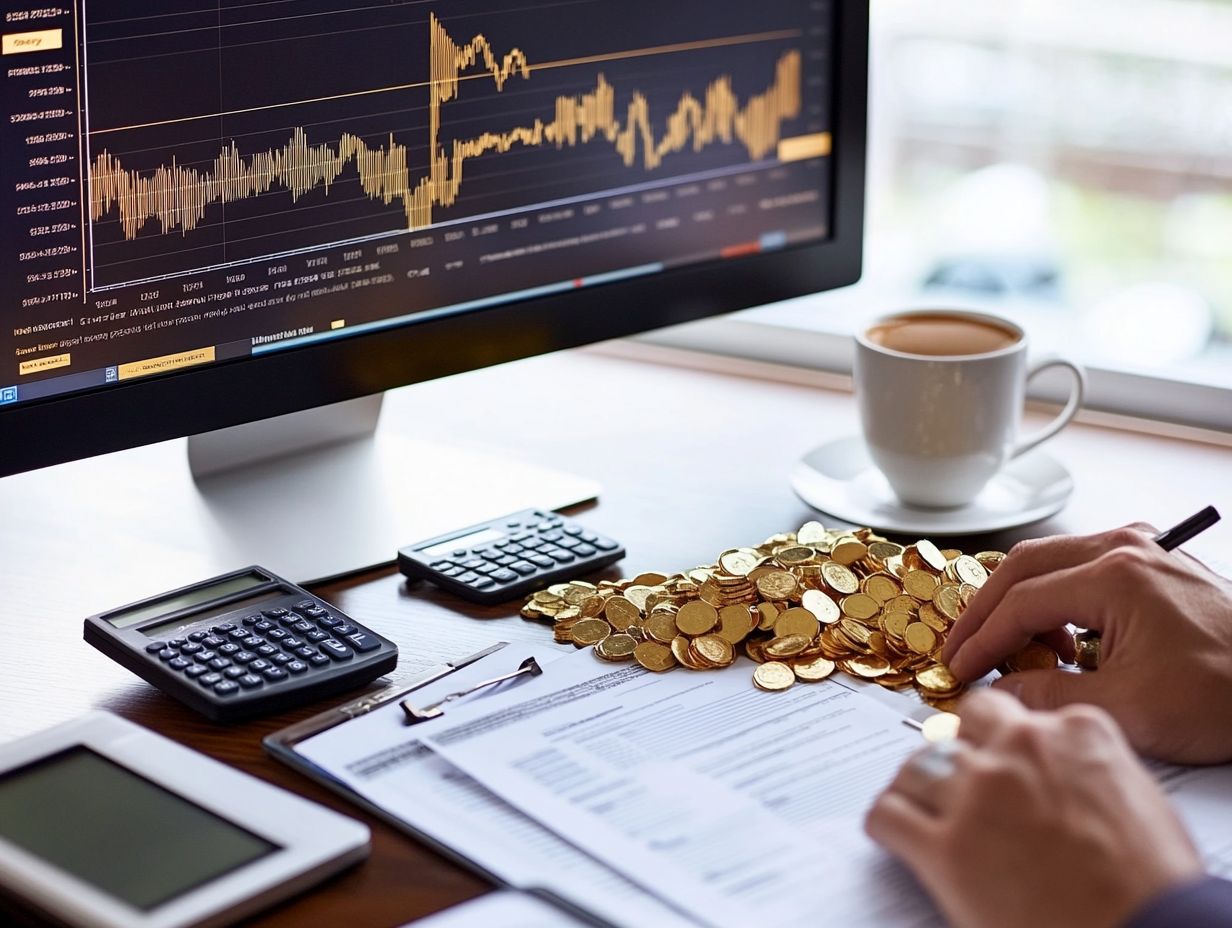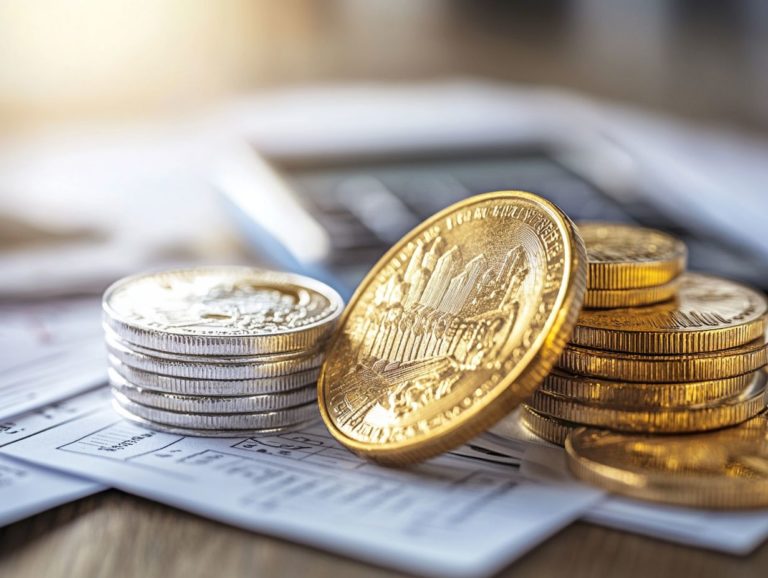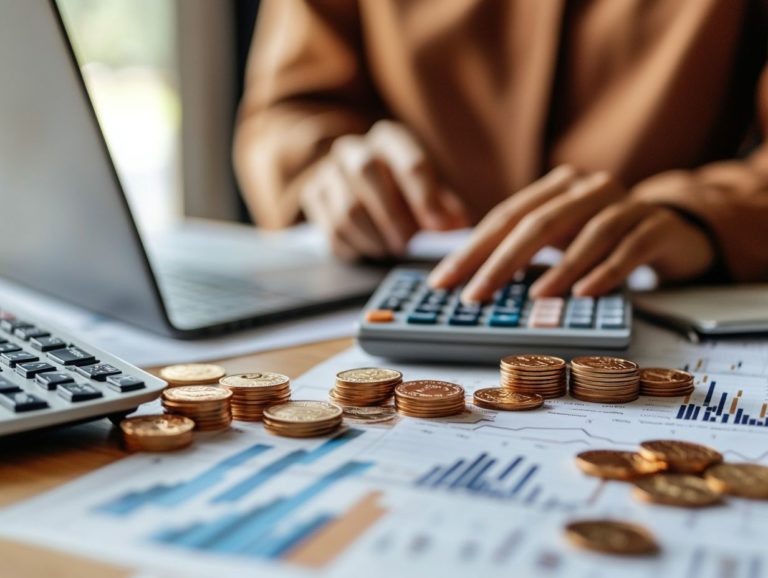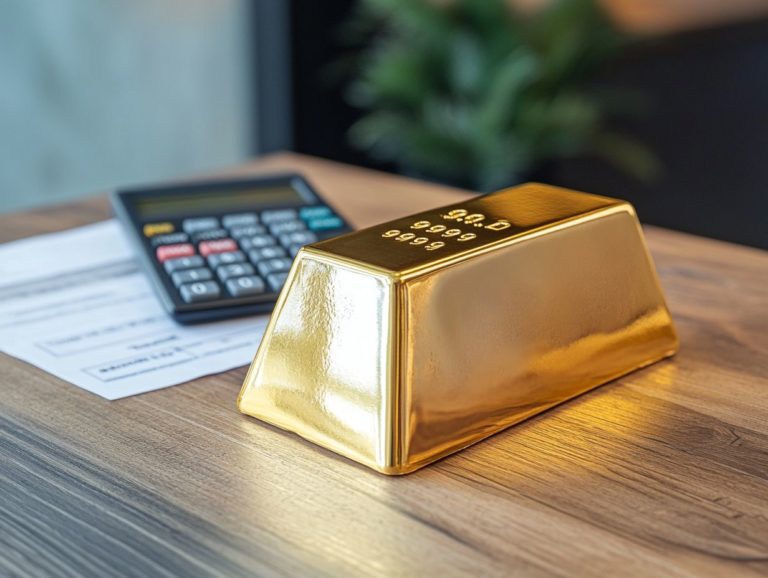Navigating Precious Metals Tax Audits
Navigating the world of precious metals can be rewarding, but it presents unique challenges, especially regarding taxes.
A precious metals tax audit can feel daunting for investors. Understanding the details is essential for ensuring a smooth process.
This article unpacks what a precious metals tax audit involves, delves into common triggers that might raise red flags, and provides vital tips for preparation and success.
Whether you re a seasoned investor or new to the market, this guide will equip you with the knowledge needed to navigate the complexities of tax audits in the precious metals arena.
Contents
- Key Takeaways:
- Understanding Precious Metals Tax Audits
- Common Triggers for Precious Metals Tax Audits
- Preparing for a Precious Metals Tax Audit
- The Audit Process
- Tips for Successfully Navigating a Precious Metals Tax Audit
- Frequently Asked Questions
- Curious about precious metals tax audits?
- Who is subject to a precious metals tax audit?
- What triggers a precious metals tax audit?
- What should I do if I am being audited for my precious metals transactions?
- What happens if I am found to have underreported my precious metals transactions?
- Are there any legal loopholes for avoiding precious metals taxes?
- Who is subject to a precious metals tax audit?
- What triggers a precious metals tax audit?
- What should I do if I am being audited for my precious metals transactions?
- What happens if I am found to have underreported my precious metals transactions?
Key Takeaways:

- Be aware of potential triggers for a precious metals tax audit, such as large transactions or discrepancies in reported income.
- Prepare for a precious metals tax audit by gathering all necessary documents and consulting a tax professional.
- During the audit, remain calm and professional. Providing accurate and complete information increases your chances of a successful outcome.
Understanding Precious Metals Tax Audits
Understanding precious metals tax audits is crucial for your financial success! Engaging in the buying and selling of valuable assets like gold and silver requires this knowledge.
The IRS keeps a close watch on these transactions due to the substantial capital gains and tax implications they generate. Capital gains are profits from selling investments for more than you paid.
Precious metals, including gold coins, gold bullion, and silver, are subject to specific regulations. These can influence both your investment choices and your tax reporting.
As you navigate tax laws and investment strategies, ensure compliance to safeguard against potential audits tied to collectibles.
What is a Precious Metals Tax Audit?
A precious metals tax audit refers to the IRS’s examination of your tax return and supporting documents related to transactions involving precious metals, like gold and silver.
These audits aim to ensure compliance with tax laws governing capital gains and the reporting of investment vehicles, including collectibles. The IRS aims to uncover any discrepancies in reported income and determine whether you have paid the appropriate taxes on profits from transactions.
Certain red flags may trigger an audit. These include significant fluctuations in your reported income, large transactions that deviate from your usual patterns, or unexpected changes in your financial situation.
During the audit, you ll need to provide documentation such as purchase invoices, sale contracts, and records of related expenses. This thorough review validates every aspect of your precious metal investments.
Ultimately, the goal is to maintain tax integrity while helping you understand your obligations.
Why are They Conducted?
Precious metals tax audits are conducted by the IRS to ensure accurate reporting of capital gains and compliance with tax implications tied to precious metals investments. This examination is essential for the IRS to verify adherence to tax laws surrounding collectibles.
The motivation behind these audits arises from the complexities involved in investing in gold, silver, and other precious metals. For more insight into these issues, navigating the complexities of precious metals taxation can help address the unique challenges in accurate reporting.
This scrutiny helps maintain the integrity of the tax system and reflects the IRS’s growing interest in how you utilize precious metals as a strategic asset. By closely examining these investments, the IRS aims to uphold tax compliance and deter potential evasion, thus safeguarding the revenue essential for national funding. Understanding tax strategies for precious metals in emerging markets can be crucial for compliance and effective investment management.
Common Triggers for Precious Metals Tax Audits
Common triggers for precious metals tax audits often stem from discrepancies or unusual patterns found in a taxpayer’s return, particularly regarding capital gains from selling precious metals.
The IRS employs algorithms and criteria to pinpoint potential audit risks, focusing on collectibles tax and any misreported income.
For further guidance, consider seeking professional help to better understand your obligations and maximize your investments in precious metals.
Red Flags for the IRS

Certain red flags can catch the IRS’s eye when reviewing tax returns. This is especially true for returns involving capital gains from precious metals, which could lead to a tax audit.
You should know that inconsistent income reporting, significant discrepancies in capital gains, and neglecting to report sales of collectibles like gold coins and bullion can all trigger their attention.
It s crucial to document your transactions carefully. This step could save you from potential issues with the IRS!
The IRS closely monitors any sudden spikes in reported income that seem out of sync with your historical earnings. Excessive deductions related to your precious metal purchases can also raise eyebrows, particularly if they appear misaligned with typical market values.
Failing to keep proper records can complicate matters. Maintaining receipts for your purchases or sales of these assets is essential.
If you frequently buy and sell precious metals, be especially vigilant, as this activity increases the likelihood of drawing the IRS’s scrutiny.
Preparing for a Precious Metals Tax Audit
Preparing for a Precious Metals Tax Audit requires careful collection of essential documents and records to ensure you meet IRS regulations.
Gather all relevant paperwork, including Form 8949 and Schedule D, which outline your capital gains and losses from precious metals transactions.
Engaging a tax professional can offer you valuable insights throughout this process, ensuring that every piece of necessary information is reported accurately.
Gathering Necessary Documents
Gathering the necessary documents for a Precious Metals Tax Audit is crucial to ensuring a seamless audit experience with the IRS. Key documents you ll need include Form 8949, where you ll detail your capital gains and losses, and Schedule D, which is used for reporting the sales of precious metals like gold and silver.
Along with these forms, compile records of all transactions related to your precious metals investments, including purchase invoices and receipts. For comprehensive guidance on this topic, consider navigating tax implications of precious metals futures. Accurate documentation provides you with a clear timeline of acquisitions and disposals, which is vital for substantiating your claims during the audit.
Keeping detailed records, such as bank statements that reflect each transaction or certificates of authenticity for your metals, creates a solid foundation for your case. By approaching the audit with thorough documentation and transparency, you can navigate the complexities of tax implications of storing precious metals offshore with greater confidence and ease.
Consulting with a Tax Professional
Consulting with a tax professional is an essential step in preparing for a Precious Metals Tax Audit. They bring specialized expertise in IRS regulations and audit preparation.
These experts guide you through the complexities of tax implications tied to your investments in precious metals. By taking on the responsibility of navigating intricate tax laws, a tax professional ensures that no detail slips through the cracks.
This promotes compliance and minimizes the risk of penalties. Their insights into the audit process can provide you with peace of mind, knowing that you have a knowledgeable ally who comprehends the nuances of tax legislation and can advocate for you.
The tailored advice offered by these professionals can lead to strategic planning that not only meets regulatory expectations but can also uncover opportunities for deductions or credits that you might otherwise overlook.
Ultimately, partnering with a tax expert can significantly simplify the audit experience, making it more manageable and less stressful overall.
The Audit Process
Navigating the audit process for Precious Metals Tax Audits can be quite intricate. It demands meticulous attention to detail as the IRS scrutinizes documentation tied to precious metals transactions.
You may find yourself needing to present comprehensive records of your dealings with gold, silver, and similar investment vehicles. These can profoundly influence your capital gains reporting.
What to Expect During the Audit

During a Precious Metals Tax Audit, expect a careful check of your financial records and transactions involving precious metals. The IRS aims to verify the accuracy of your reported capital gains. This thorough review involves looking closely at documents related to gold coins, bullion, and other collectibles.
The process starts with the IRS sending you a notice. This notice will ask for specific records and details for the relevant tax year. You may need to provide purchase invoices, sales receipts, and documentation of any storage arrangements for your precious metals. Additionally, it’s important to be aware of the tax implications of buying and selling precious metals. The inquiries may delve into how you reported your gains, including details about the holding period and any previous transactions involving similar assets.
The audit’s primary goal is to ensure that all your assets have been accurately reported and that appropriate taxes have been paid, helping you maintain compliance with tax laws.
Navigating a Precious Metals Tax Audit can feel overwhelming, but with the right strategies, you can tackle it head-on! Successfully navigating it demands careful preparation and a keen understanding of IRS procedures, especially concerning precious metals investments. Use strategies that stress compliance and open communication with IRS agents.
This approach helps you prevent potential issues during the audit.
Key Strategies for a Positive Outcome
Using key strategies can reduce stress and improve your compliance with IRS rules during a Precious Metals Tax Audit. These strategies include meticulous documentation of all transactions involving precious metals and enlisting the expertise of tax professionals.
Keeping accurate records is essential. Be proactive when interacting with IRS agents. This fosters a collaborative atmosphere where questions can be addressed transparently. Understanding the nuances of navigating tax regulations for precious metals investments specific to precious metals transactions, whether it’s bullion purchases or the sale of collectibles, can also help prevent misunderstandings during the audit process.
Leveraging software tools for record-keeping can streamline your efforts, ensuring that all financial data is easily accessible. By approaching the audit with a well-prepared mindset and a solid grasp of the relevant regulations, you can navigate the complexities of tax compliance with greater confidence.
Frequently Asked Questions
Curious about precious metals tax audits?
Precious metals tax audits are investigations conducted by the government to ensure that individuals and businesses comply with tax laws and accurately report their precious metals transactions.
Who is subject to a precious metals tax audit?
Anyone who buys, sells, or holds precious metals may be subject to a tax audit. This includes individuals, businesses, and organizations.
What triggers a precious metals tax audit?
Audits can be triggered by a variety of factors, such as large or frequent transactions, inconsistencies in reported income, or tips from other individuals or businesses.
What should I do if I am being audited for my precious metals transactions?
If you are being audited, it is important to remain calm and cooperate with the auditors. It is also recommended to seek the advice of a tax professional who specializes in precious metals transactions.
What happens if I am found to have underreported my precious metals transactions?
If you are found to have underreported your precious metals transactions, you may be subject to penalties and interest on the unpaid taxes. It is important to be honest and accurate in reporting your transactions to avoid potential consequences.
Are there any legal loopholes for avoiding precious metals taxes?
Stay alert! Tax laws often change, and they can differ based on where you live. Relying on loopholes or questionable tactics to avoid taxes on precious metals is risky. Always consult a tax professional for the best advice on planning and compliance.

Who is subject to a precious metals tax audit?
If you buy, sell, or hold precious metals, you may face a tax audit. This includes individuals, businesses, and organizations.
What triggers a precious metals tax audit?
Various factors can trigger audits. Large or frequent transactions, inconsistencies in reported income, or tips from others can raise red flags.
What should I do if I am being audited for my precious metals transactions?
Stay calm if you re audited and cooperate with the auditors. It s wise to get advice from a tax professional who knows about precious metals transactions.
What happens if I am found to have underreported my precious metals transactions?
If you underreport your transactions, you could face penalties and interest on unpaid taxes. Being honest and accurate in your reporting can help you avoid penalties.














